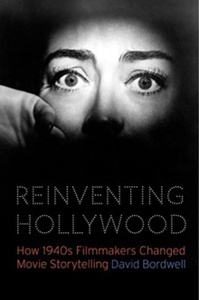Reinventing Hollywood
How 1940s Filmmakers Changed Movie Storytelling

Editorial University Of Chicago Press
Fecha de edición febrero 2019 · Edición nº 1
Idioma inglés
EAN 9780226639550
592 páginas
Libro
encuadernado en tapa blanda
Dimensiones 228 mm x 160 mm
Resumen del libro
In the 1940s, American movies changed. Flashbacks began to be used in outrageous, unpredictable ways. Soundtracks flaunted voice-over commentary, and characters might pivot from a scene to address the viewer.
Incidents were replayed from different characters' viewpoints, and sometimes those versions proved to be false. Films now plunged viewers into characters' memories, dreams, and hallucinations. Some films didn't have protagonists, while others centered on anti-heroes or psychopaths.
Women might be on the verge of madness, and neurotic heroes lurched into violent confrontations. Combining many of these ingredients, a new genre emerged--the psychological thriller, populated by women in peril and innocent bystanders targeted for death. If this sounds like today's cinema, that's because it is.
In Reinventing Hollywood, David Bordwell examines for the first time the full range and depth of trends that crystallized into traditions. He shows how the Christopher Nolans and Quentin Tarantinos of today owe an immense debt to the dynamic, occasionally delirious narrative experiments of the Forties. With verve and wit, Bordwell examines how a booming movie market during World War II allowed ambitious writers and directors to push narrative boundaries.
Although those experiments are usually credited to the influence of Citizen Kane, Bordwell shows that similar impulses had begun in the late 1930s in radio, fiction, and theatre before migrating to film. And despite the postwar recession in the industry, the momentum for innovation continued. Some of the boldest films of the era came in the late forties and early fifties, as filmmakers sought to outdo their peers.
Through in-depth analyses of films both famous and virtually unknown, from Our Town and All About Eve to Swell Guy and The Guilt of Janet Ames, Bordwell assesses the era's unique achievements and its legacy for future filmmakers. The result is a groundbreaking study of how Hollywood storytelling became a more complex art. Reinventing Hollywood is essential reading for all lovers of popular cinema.
Biografía del autor
David Bordwell, nacido en Estados Unidos en es uno de los estudiosos y teóricos del cine más importantes. Doctor en Cine por la Universidad de Iowa, es profesor de Estudios Cinematográficos en la Universidad de Wisconsin, Madison, y autor, entre otros, de 18 títulos entre los que destacan: El significado del filme, El arte cinematográfico (con Kristin Thompson, su esposa) o El cine clásico de Hollywood (con Kristin Thompson y Janet Staiger), todos ellos también publicados por Paidós. Bordwell está considerado el padre de la teoría cognitiva del cine. Más próximo al neoformalismo que a las teorías interpretativas de raíz psicológica, Bordwell ha sido un gran estudioso de la obra de cineastas tan importantes como Dreyer, Ozu y Eisenstein.








